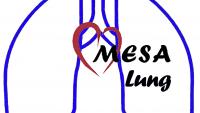The MESA Lung Study

Background
Chronic lower respiratory disease (CLRD) is currently the fourth leading cause of death in the United States and globally. CLRD prevalence and mortality are increasing, particularly among women and minorities. Despite the magnitude of the problem, therapeutic options are limited. The most morbid components of CLRD are chronic obstructive pulmonary disease (COPD), which is defined by accelerated age-related loss in lung function, and emphysema, which is characterized accelerated loss of lung parenchyma and elasticity.
The understanding of the pathogenesis of COPD has moved beyond the protease-antiprotease hypothesis to include hypotheses relating to chronic inflammation and endothelial activation. The biological hypothesis that underlies the MESA Lung Study that alterations in endothelial and vascular function are associated with the pathogenesis and progression of subclinical COPD and emphysema, in part through the effects of systemic inflammation on the vascular endothelium and that these have effects on both the pulmonary and cardiac systems.
Multi-Ethnic Study of Atherosclerosis (MESA)
MESA is a prospective cohort study funded by the National Heart, Lung, Blood Institute (NHLBI) to investigate the prevalence, correlates and progression of subclinical cardiovascular disease in individuals without clinical cardiovascular disease. The MESA recruited 6,814 men and women ages 45-84 years old, in six U.S. communities in 2000-02: Forsyth County, NC; Northern Manhattan and the Bronx, NY; Baltimore City and Baltimore County, MD; St. Paul, MN; Chicago, IL; and Los Angeles, CA. MESA participants are non-Hispanic white, Hispanic, African-American, or Asian. Exclusion criteria included clinical cardiovascular disease (physician diagnosis of heart attack, stroke, TIA, heart failure, or angina), atrial fibrillation, any cardiovascular procedure, pregnancy, active cancer treatment, weight >300 lbs, serious medical condition which precluded long term participation, nursing home residence, cognitive inability, inability to speak English, Spanish, Cantonese, or Mandarin, plan to leave the community within five years, and chest CT within the past year.
MESA participants were characterized during a baseline clinical visit in 2000-2002 with questionnaires, EKG, ankle-brachial index, cardiac CT and MRI scanning, carotid ultrasound, flow-mediated dilation (FMD) and arterial wave-form measures. Most measures were repeated on at least one of six follow-up visits through 2018. Additional details and protocols are available on the MESA website, www.mesa-nhlbi.org.
The MESA-Family Study was a family-based study that recruited over 1,800 African-Americans and Hispanics who were predominantly family members of MESA participants under the same inclusion criteria as MESA except that clinical cardiovascular disease was permitted. The MESA-Air Pollution Study recruited 257 participants at two sites under the same inclusion criteria as MESA.
MESA Lung Study
The MESA Lung Study is an epidemiologic study funded by NHLBI initially to test endothelial hypothesis of COPD and emphysema, in addition to examining subclinical cardiopulmonary interactions. In 2004-06, the MESA Lung Study recruited 3,965 participants sampled randomly from MESA participants who had baseline FMD measures (89% of MESA), attended MESA Exam 3 or 4 (87% of MESA), and consented to genetic analyses (99% of MESA). Participants in the MESA Air Pollution Study were also recruited. Minority race/ethnic groups were oversampled; the MESA Lung cohort comprises approximately 35% non-Hispanic whites, 24% African-Americans, 23% Hispanics and 18% Chinese-Americans. 3,205 were re-examined in 2010-12, and over 2,600 have been reexamined in 2017-18.
Lung Function
All MESA-Lung participants were asked to partake in standardized spirometry testing performed by certified technicians following ATS/ERS guidelines using Sensormetics spirometers and OMI software (ref 1) in 2004-06, 2010-12 and 2017-18. Post-bronchodilator spirometry was obtained on the second and third ext.
Lung Structure
MESA cardiac CT scans visualized approximately three-quarters of the lung volume. The MESA Lung Study assessed lung density measures (percent emphysema and other measures) in the lung windows of all baseline and follow-up cardiac CT scans of MESA-Lung participants at the University of Iowa following a validated protocol (ref 2).
The MESA Lung Study performed full-lung CT scans on six MDCT scanners for over 3,200 participants in 2010-12 following the MESA Lung/SPIROMICS CT protocol (ref 3) and 2,500 on Siemens Force scanners in 2017-18, including over 700 with contrast to assess the pulmonary vasculature. These have been used to develop reference equations for percent emphysema and total lung volume on CT (ref 4).
Summary of lung phenotypes available in the MESA Lung Studies The MESA-Lung Study is also measuring cotinine, a biomarker of cigarette smoke, and various biomarkers on all MESA-Lung participants.
References
- Hankinson JL, Kawut SM, Shahar E, Smith LJ, Stukovsky KH, Barr RG. Performance of American Thoracic Society-recommended spirometry reference values in a multiethnic sample of adults: the Multi-Ethnic Study of Atherosclerosis (MESA) Lung Study. Chest 2010;137:138-45.
- Hoffman EA, Jiang R, Baumhauer H, et al. Reproducibility and validity of lung density measures from cardiac CT scans. The Multi-Ethnic Study of Atherosclerosis (MESA) Lung Study. Acad Radiol 2009;16:689-99.
- Sieren JP, Newell JD Jr, Barr RG, Bleecker ER, Burnette N, Carretta EE, Couper D, Goldin J, Guo J, Han MK, Hansel NN, Kanner RE, Kazerooni EA, Martinez FJ, Rennard S, Woodruff PG, Hoffman EA; SPIROMICS Research Group. SPIROMICS Protocol for Multicenter Quantitative Computed Tomography to Phenotype the Lungs. Am J Respir Crit Care Med. 2016 Oct 1;194(7):794-806.
- Hoffman EA, Ahmed FS, Baumhauer H, Budoff M, Carr JJ, Kronmal R, Reddy S, Barr RG. Variation in the percent of emphysema-like lung in a healthy, nonsmoking multiethnic sample. The MESA lung study. Ann Am Thorac Soc. 2014 Jul;11(6):898-907.